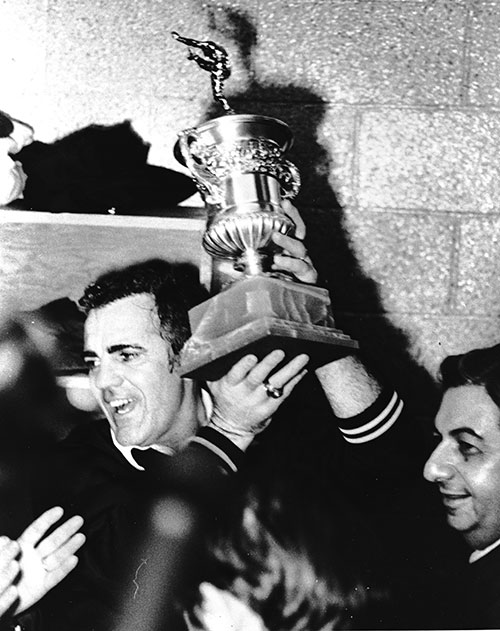Ara Celebrates the 1973 National Championship after the Sugar Bowl win over Alabama. (Photo: University of Notre Dame )
Editor’s note: This May 21, Ara Parseghian, the legendary Notre Dame head football coach from 1964-1975 would have been 101 years old. Ara led the Irish to two National Championships, 1966 and 1973. He passed away on August 2, 2017. Frank Pomarico was one of the Captains of the 1973 team. Here is Frank’s story about how Ara molded that team.
Playing for Ara Parseghian was like playing for royalty. He was our King Arthur and we were his Knights. Needless to say, Ara was a very good football coach, a Hall of Fame coach, but, he was an even better human being. He was a manifestation of everything Notre Dame wanted to be noted for: character, class, integrity, and charisma. He shared these characteristics with us, his players, and his legacy has lived on in these past fifty years as his players have gone on to make a difference in other people’s lives in many different ways. Ara thought of a great day as one in which you could help people who couldn’t return the favor, doing so out of the goodness of your heart. He instilled this practice in all of us.
Ara was a great people coach, but, to me it seemed that coaching was just the vehicle he used to reach people and put them on the right track. He could have been a governor, senator, or even the president of the United States. That’s how organized and charismatic he was. He had tremendous focus and discipline to make things happen, all in the service of others. King Arthur is a good comparison to describe Ara, he did things because it was the right thing to do for people and the program not because he had to. As with King Arthur, there was a sense of Camelot that seemed to travel with Ara. He was a person who when he came into a crowded room people would say “I don’t know who that person is, but I want to meet him.”
Ara’s coaching philosophy was rooted in five basic principles: faith, family, pride, discipline, and loyalty. He recruited people who he knew could live by these principles. He didn’t just want good football players, instead he wanted people to be a part of his family. People that could fit in anywhere, especially at Notre Dame where leaders of society are groomed to go into the world and make a difference.
The faith I’m talking about here wasn’t about religion. It was about the goodness inside of a person along with the desire to do the right thing as much as possible. He wanted positive-thinking people who had manners and respected others. After Ara assessed those parts of a person’s character, he looked for people who were hungry to compete. If recruits had these raw elements as a person, Ara felt he and his staff could mentor them into a team.
Ara worked us hard in practice and expected us to us to give our full attention to our classroom studies. We did that and I believe nearly every player on Ara’s teams graduated from Notre Dame, which was his main goal. He also expected the same work ethic and discipline from our student managers and trainers who he considered a part of the team too. What a gift it was to play top level college football and graduate with a solid degree to take with us in our life after football. All this became possible because of Ara Parseghian’s values on life.
After four years in Ara’s program we all had developed a lot of discipline and we all held on to it for these past fifty years. We wouldn’t have been able to succeed without the discipline Ara insisted on. What did that mean? First of all, it meant establishing goals and determining how we could achieve them. For Notre Dame Football players, this meant being in good shape physically, academically sound, and not getting into trouble on and off campus.
The idea of not getting into trouble was not just an individual rule. We were expected to look out for each other. If we saw someone associated with the team going off the grid and doing something that would hurt them personally or the team as a whole, we did what we could to get that person on the right path. That’s why I use the word “brothers” to describe my teammates. We treated each other as we would a family member. This is why Ara’s program was so special. If you were part of Ara’s family you felt special. You carried that unique training to your life after football.
People in Ara’s program got things done and everyone learned the basic principles of preparation and hard work. The players were loyal to Ara because he was as fair as possible. Ara would always make an educated decision with input from the other coaches as well as the captains if needed, whenever he would have to discipline a player. Ara always made the final decision and it was always fair. We knew he always had our interest at heart.
As far as our National Championship team in 1973, it is interesting that while we did have talented players, the real glue of the team was the desire the team prepared and played with. I missed the first four games of the year with a torn ankle. Tom Bolger stepped in and did a terrific job. We didn’t skip a beat in our running game or passing game. Tom Bolger was maybe the best athlete on the offensive line. He was strong, had good speed, was a smart ballplayer and tough as nails. The other backup guard was Dan Morrin who also had great speed and strength. Both of these guys could have played on any top ten offensive line, however, I’m glad they were at Notre Dame because we needed them. Tom Bolger hurt his knee in the Rice game just as I was ready to come back from my ankle injury. Dan Morrin then replaced me on all the special teams which made a huge difference in the Sugar Bowl. In that game for the National Championship, he made the key block on the kickoff return when Al Hunter went 93 years for a touchdown. I usually introduce Dan Morrin as the guy who won the Sugar Bowl for us because he made that block on the touchdown. If he didn’t we wouldn’t have won 24-23.
Getting ready to play Alabama in the Sugar Bowl for the National Championship came down to the last weekend of the regular season. We finished undefeated by beating Air Force on Thanksgiving Day at Notre Dame Stadium, 48-15. At the team meeting the day after the game, Ara addressed the team on the possibilities of playing for the National Championship. We were ranked fifth, Michigan and Ohio State were ahead of us at four and three. Oklahoma was ranked second but not eligible because of being on probation. Ara told the team there is a chance we could be playing for the National Championship. but only if Michigan and Ohio State tied.
How likely was that? The next day Michigan and Ohio State tied and amazingly we were off to New Orleans to play Alabama.
There were so many storylines that came into play leading up to the matchup. The North against the South, the Baptist against the Catholics, two storied football programs Alabama and Notre Dame, and two Hall of Fame coaches Bear Bryant against Ara Parseghian. The build up to the game was great. This was two undefeated untied teams playing for all the marbles. The game was Notre Dame’s strength and size against the great overall speed and talent of Alabama.
Alabama had a very good defense, but, had not faced a running game like the Irish. We were averaging 350 yards a game on the ground. However, the Alabama offense was a great triple option team that could pass as well. They had two complete backfields, one led by Richard Todd and one led by Jeff Rutledge. The backs on both sets of backfields were strong and fast.
The Irish defense had its hands full.
On New Year’s Eve 1973 the weather was about 45 degrees and rainy. As the game got closer it stopped, but, it didn’t matter: we knew we were playing in the game of our lives.
The lead changed hand six times. It all came down to the final 2 minutes and 41 seconds. We had a third down and 3 from our own eight yard line. Ara called a time out and called the famous play. Not a safe run, but a pass, a gutsy call in the shadow of our goal post. By making that call, Ara showed his belief in the team he had built.
We were told to “hold the count”. All-American tight end David Casper reminded us of that before we went to the line of scrimmage. Despite that reminder, after we got set, someone went offsides. We thought it was Alabama, but, it was us. It was David Casper who had made spectacular catches and unbelievable blocks during the game who didn’t “hold the count” and went off sides!
Now it was 3rd and 8 from our three yard line. Ara called the same play, an even riskier call now! The only difference was Ara put in tight end Robin Weber instead of wide receiver Peter Demmerle to make it look more like a run. Casper was the main target. Alabama however had three men on him and he wasn’t open. Tommy Clements, as cool as the other side of the pillow, looked elsewhere and lofted a perfect spiral to Weber, who had caught one pass all year. Weber caught this one for 35 yards and a first down.
That play is now etched in Notre Dame history.
We were then able to run out the clock and won the National Championship. Our offense played great having 421 total yards against an awesome Alabama defense. But, our Notre Dame defense held an explosive Alabama offense to just 317 yards.
When all is said and done, the game was so close and so exciting that the contest is now considered by many people as the greatest Sugar Bowl ever. And It all came down to Ara’s willingness to trust the team he had built to make that one big play.

